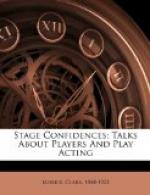Perhaps some day a woman of fashion, simply clad, will turn up her pretty nose contemptuously at splendour of dress at church service, and whisper, “What bad form!”
Then, indeed, as the tide sets her way, she will realize her power, and the church will have many more attendants. The very poor woman will not be so cruelly humiliated, and the wage-earning girl, who puts so much of her money into finery, will have a more artistic and more suitable model to follow.
And you are beginning to think that free silver is not the only mad idea that has been put forward by a seemingly sane person. Ah, well, it’s sixteen to one, you know, that this is both first and last of the church dress-reform.
To those two little maids who so anxiously inquire “if I believe prayer is of any real service, and why, since my own could not always have been answered,” I can only say, they being in a minority, I have no authority to answer their question here. Perhaps, though, they may recall the fact that their loving mothers tenderly refused some of their most passionate demands in babyhood. And we are yet but children, who often pray improperly to our Father.
CHAPTER XVII
A DAILY UNPLEASANTNESS_
What is the most unpleasant experience in the daily life of a young actress?
Without pause for thought, and most emphatically too, I answer, her passing unattended through the city streets at night; that is made unalloyed misery, through terror and humiliation. The backwoods girl makes her lonely way through the forest by blazed trees, but the way of the lonely girl through the city streets is marked by blazing blushes.
It is an infamy that a girl’s honesty should not protect her by night as well as by day. Those hideous hyenas of the midnight streets are never deceived. By one glance they can distinguish between a good woman and those poor wandering ghosts of dead modesty and honour, who flit restlessly back and forth from alleys dark to bright gas glare; but bring one of these men to book, and he will declare that “decent women have no right to be in the streets after nightfall,” as though citizens were to maintain public highways for the sole use one-half the time of all the evil things that hide from light to creep out at dark and meet those companions who are fair by day and foul by night.
Some girls never learn to face the homeward walk with steady nerves, others grow used to the swift approach, the rapidly spoken word, and receive them with set, stony face and deaf ears; but oh, the terror and the shame of it at first! And this horror of the night takes so many forms that it is hard to say which one is the most revolting—hard to decide between the vile innuendo whispered by a sober brute or the roared ribaldry of a drunken beast.




